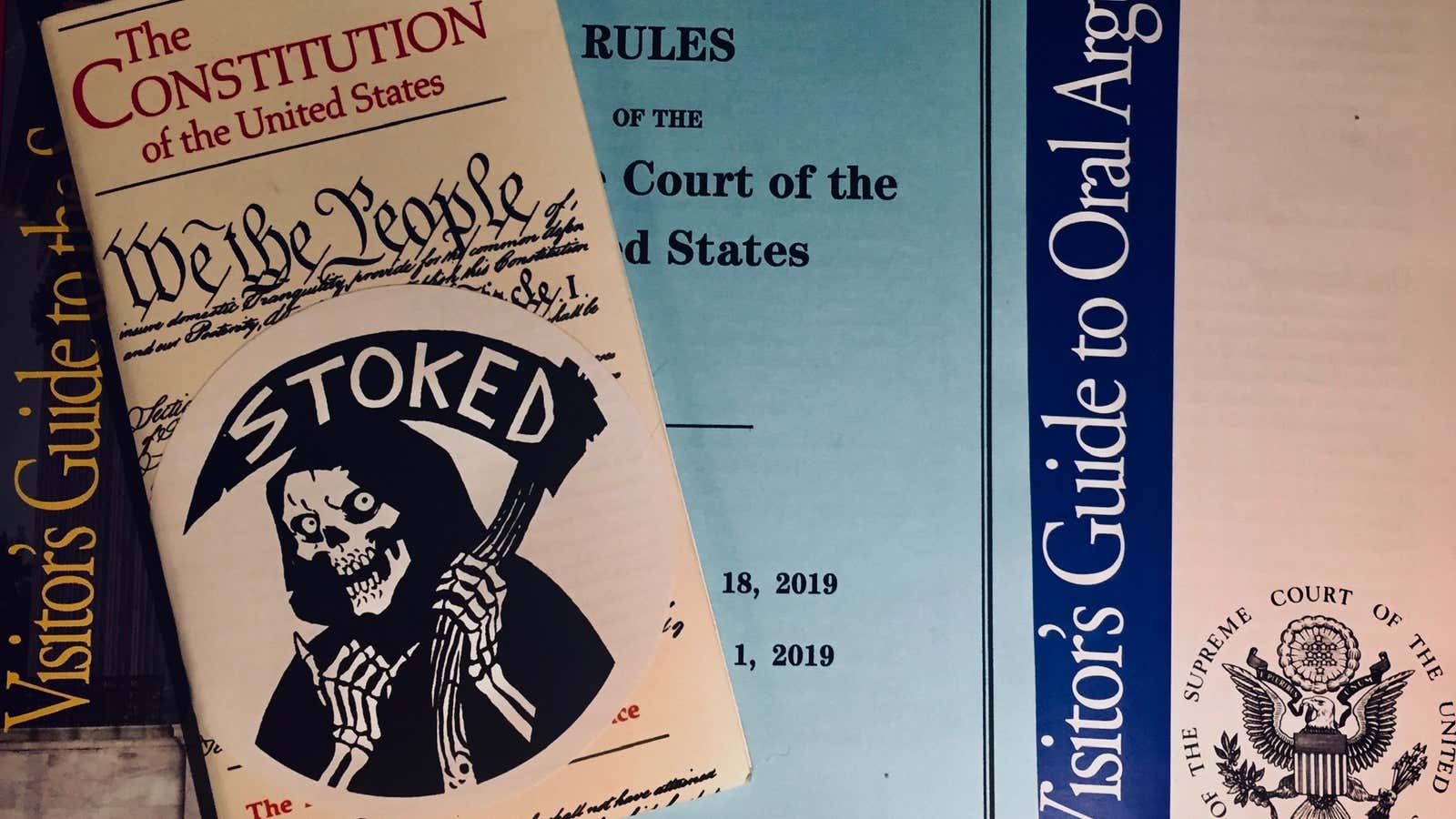While many Americans have Zoomed into the future, videoconferencing their way through the pandemic, the US Supreme Court is old-school and chats over the phone. Today, the justices will hold a doubly historic hearing, live-streaming their first-ever telephonic oral arguments—ironically, in a trademark case that could change the internet.
Court commentators have hailed the event as “revolutionary.” That’s because oral arguments have never been broadcast live. Cameras are barred in the courtroom and sound recordings are published on the court’s websites days after they happen. Transparency advocates have long argued for more direct access to the debates, which the staid institution has resisted. But the coronavirus crisis forced the court, along with everyone else, to adapt to the new circumstances. That is, to some extent.
Normally, the court allows a limited number of visitors who wait in line and credentialed press. Depending on how controversial a case is, people may or may not get in. But the wider public around the country can’t listen in usually.
While courts across the country quickly took to videoconference hearings, the Supreme Court justices initially cancelled their arguments. But as a month of crisis has turned into two, they are gingerly stepping into the future.
The new format won’t really illuminate how oral arguments go normally because certain rules have been instituted to ensure order in this abstracted courtroom. The justices won’t be cutting each other and the lawyers off with their competing questions, but taking turns. And there will be no way to note the looks they give each other when a colleague seems to be on point or going off the rails. Chief justice John Roberts, for example, can’t help seeming just a wee bit irritated at times when Stephen Breyer goes into one of his soliloquies masquerading as a question. And none will know when Neil Gorsuch is ignoring the proceedings, busily handling paperwork at the bench, seemingly bored by the case before him.
Despite the excitement about the increased transparency, the hearing may not prove that illuminating to many listeners. Arguments can be very hard to follow without advance preparation. Sure, justices speak English and the law is made up of words. But there are terms of art, meaning that legal formulations don’t necessarily convey the same thing as everyday conversation. And the issues the justices tackle are highly technical. Often, the debates are about statutes few non-jurists have ever had cause to consider and obscure rules about timing and deadlines for filing, say.
It may well be that after these old-timey radio-like livestreams the clamor for more access to the court will die down simply because the public discovers the justices’ debates are hard to parse.
Take today’s case, for example. It’s highly consequential and has the potential to influence the future of the internet—what sites we see and what sites can even come to be. Yet the issues may superficially seem like a snooze, especially since this is a fight over generic terms.
The matter arises from a dispute between the online booking agency Booking.com and the US Patent and Trademark Office (USPTO). The USPTO denied the company a trademark saying that adding a “.com” to a generic term like “booking” doesn’t turn the word into a protectable piece of intellectual property. Because booking is a common word and “.com” simply signifies what kind of domain the company has—as opposed to “.org” for a non-profit or “.gov” for a governmental institution—the USPTO says the company has no claim of distinction or ownership.
The non-profit Electronic Frontier Foundation (EFF) filed a “friend of the court” brief siding with the USPTO on generic terms. Two wrongs don’t make a right nor do two common words create an enforceable trademark when joined, the organization argues. Its attorneys argue that use of a “.com” domain name in the digital world is no more distinct than a company using the abbreviation “Co.” in the physical universe. “The .com suffix was designed to be a generic identifier of commercial entities online, and that is exactly what it is,” the brief explains.
If the Booking.com trademark is registered by the USPTO, then the company can police this intellectual property and scare away competition, securing a “linguistic monopoly.” It already claimed the .booking domain and could threaten competitors using second-level domains that include the generic term or a close variant, like ebooking.com, or bookings.com, or even booker.com. Allowing Booking.com to trademark its name will lead to chaos on the web, EFF says.
Booking.com argues that its name has become distinctive. Surveys show that most consumers already associate the Booking.com name with the company, it contends. So the name made up of two generic terms has become unique. It says adopting the government’s position in this case “is nonsense” because there are plenty of trademarks based on a composite of generic terms, like The Container Store,” say. “Seeking a date? Try Dating.com. Want to impress with concert tickets? Tickets.com or Concert.com can get them. Hoping for nice weather? Check Weather.com,” the Booking.com brief advises the justices.
Based on today’s questions, we may get some sense of how the justices are thinking about these issues. But we won’t get to read the facial expressions for the sometimes subtle or obvious messages they send across the bench. A decision is expected by term’s end in late June.
